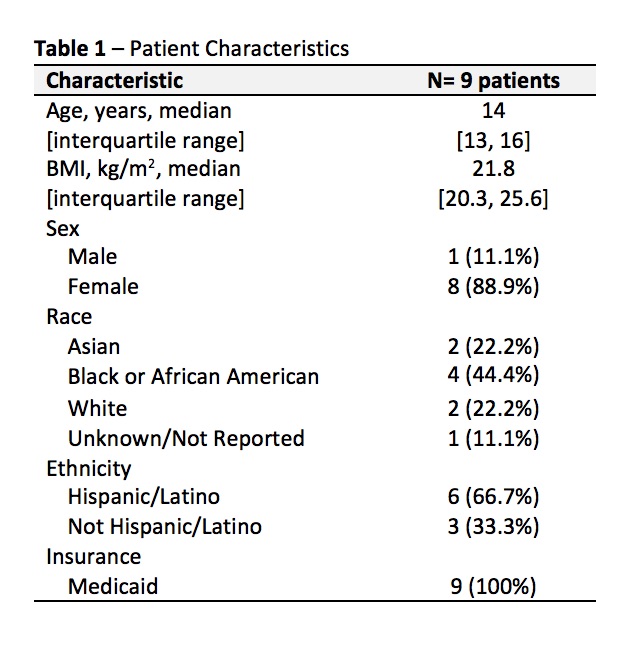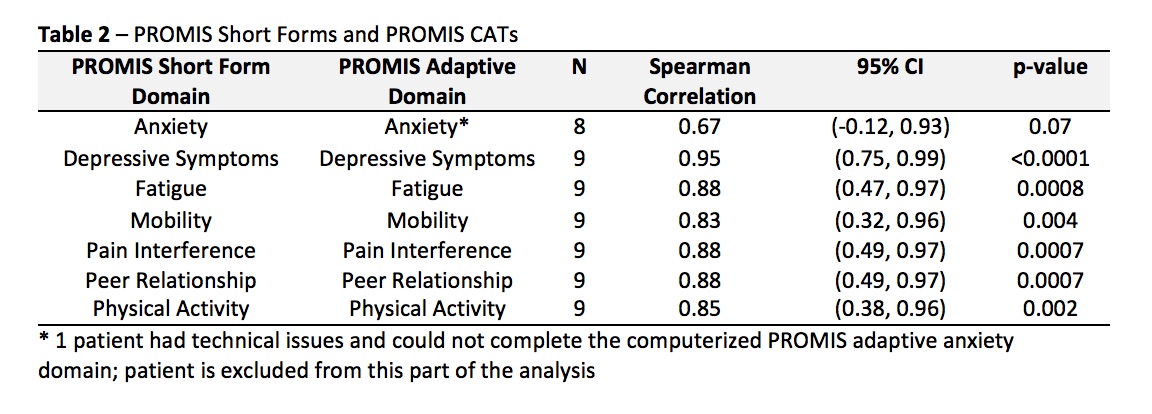Background/Purpose: It has been established that pediatric Systemic Lupus Erythematous (pSLE) is associated with lower health-related quality of life (HRQOL); however, there are few studies that evaluate specific HRQOL constructs in pSLE. We designed this cross-sectional study to evaluate 1) Patient Reported Outcomes, measured by a) the Patient Reported Outcomes Measurement Information System (PROMIS) short forms, and b) PROMIS computerized adaptive tests (CATs); and 2) Resilience, measured by the 10-item Connor-Davidson Resilience Scale (CD-RISC 10) in children with pSLE. We hypothesize that PROMIS CATs will be a reliable HRQOL tool for use in pSLE and that the scores will correlate with patient resilience measures.
Methods: A convenience sample of patients with pSLE (N = 9) was recruited from a single academic center. Patients aged 11 to 18 years completed 7 of the available pediatric PROMIS Short Forms and CATs (Anxiety, Depressive symptoms, Fatigue, Mobility, Pain Interference, Peer Relationships, Physical Activity) as well as the Patient Global Health Assessment and the CD-RISC 10 questionnaire for resilience. Additionally, the treating physician completed the Physician Global Disease Activity Scale and the Systemic Lupus Erythematous Disease Activity Index (SLEDAI) for each patient. Descriptive summaries were reported, and the correlations of the various measures were evaluated using Spearman correlation coefficients.
Results: All 9 patients approached completed the PROMIS CATs, Patient Global Health Assessment, and CD-RISC 10. Median age was 14 years (IQR 13 – 16 years), and mean SLEDAI score was 5.1 (SD 4.3). Patient Global Health Assessment mean score was 6.8 (SD 2.7), Physician Global Health Assessment mean score was 1.8 (SD 1.1), and CD-RISC 10 mean score was 24.2 (SD 9.7). All PROMIS domains showed strong positive correlation between the Short Form and CAT reaching statistical significance in all except Anxiety (p=0.07). Increased anxiety PROMIS scores had a strong negative correlation with the Patient Global Health Assessment. Higher CD-RISC 10 scores (indicating higher resilience) demonstrated positive correlation with increased SLEDAI scores. There was no significant correlation between the Physician Global Disease Activity Scale and any PROMIS domain or the CD-RISC 10.
Conclusion: Our results demonstrate that the PROMIS CATs are feasible to administer in an outpatient pediatric rheumatology setting and that they are a reliable tool when compared to the PROMIS Short Forms. Anxiety was strongly negatively correlated with the Patient Global Health Assessment score, suggesting that anxiety may uniquely impact overall perception of health in patients with pSLE. Although there was no significant correlation between the CD-RISC 10 and either the PROMIS or the Patient Global Health Assessment, CD-RISC 10 scores in our population were substantially lower than those of adolescents with other chronic medical conditions. Our major limitation was small sample size, and larger comparative studies are needed to evaluate resilience scores in pSLE patients, as well as their correlations with disease activity and HRQOL.
The post Patient Reported Outcomes and Resilience in Pediatric Systemic Lupus Erythematosus appeared first on ACR Meeting Abstracts.


